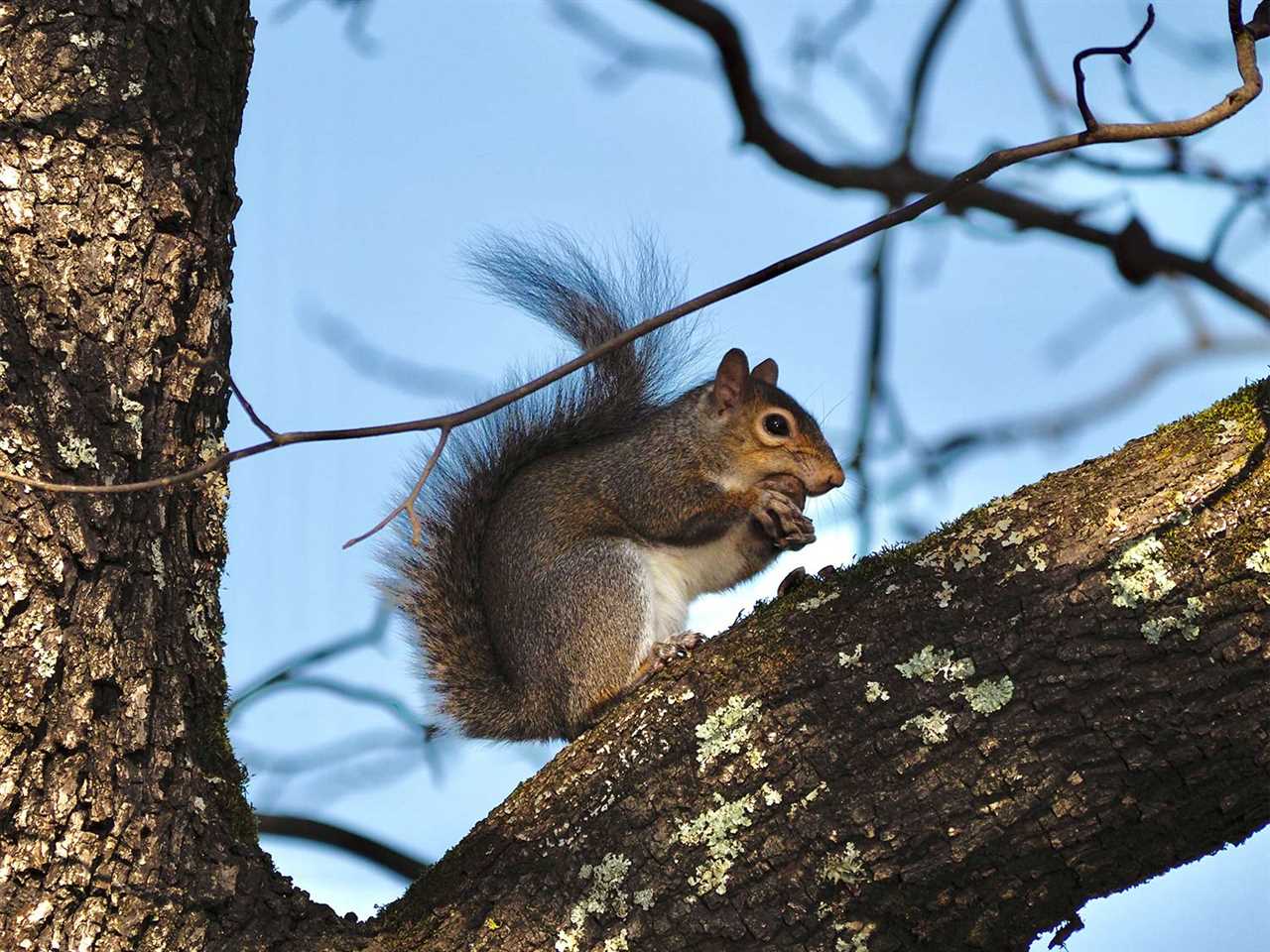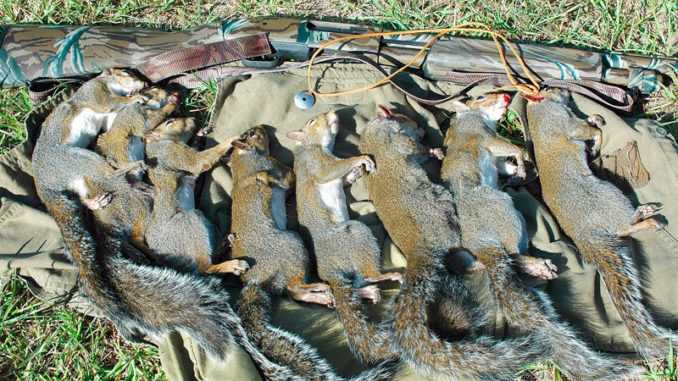Contents
All You Need to Know About Hunting Squirrels During Open Season: A Complete Guide

Squirrels are fascinating creatures that inhabit our forests and woodlands. With their agile movements and bushy tails, they are a delight to watch in the wild. However, for seasoned hunters, autumn brings open season for hunting squirrels. Armed with a rifle, hunters embark on the quest to capture this elusive game.
Hunting squirrels not only provides a thrilling adventure but also contributes to wildlife conservation. As an abundant species, squirrels play a crucial role in maintaining the ecological balance of their habitats. By participating in the hunting season, hunters help prevent overpopulation and ensure that the squirrel population remains healthy and sustainable.
The open season for hunting squirrels typically coincides with the fall months, when the foliage starts to change and the weather becomes crisp. It is during this time that squirrels actively forage for food, stockpiling acorns and nuts to prepare for the winter ahead. This makes autumn the perfect time for hunters to track and observe squirrel behavior.
To become a successful squirrel hunter, one must possess not only the right skills but also the necessary knowledge about the game. Squirrels are notorious for their sharp senses and cautious nature, making them a challenging target. Patience, stealth, and accurate marksmanship are essential to outwit these cunning creatures.
Understanding Open Season Hunting Regulations

In the world of wildlife management and conservation, open season refers to a specific time period when hunting is allowed for a particular game species. Open season hunting regulations are put in place to ensure the sustainability of the wildlife population, while also providing opportunities for responsible hunters to engage in their favorite outdoor activity.
Hunting squirrels during open season can be an exciting and rewarding experience for rifle enthusiasts. The distinct sound of a shot echoing through the autumn woods, the thrill of stalking game, and the satisfaction of a successful hunt are all part of the allure.
Open season hunting regulations vary from state to state, and it is essential for hunters to familiarize themselves with the specific rules and requirements of the area they plan to hunt in. These regulations often include information such as the dates of the open season, bag limits, hunting methods allowed, and any special restrictions or guidelines.
For squirrel hunters, open season typically occurs in the fall, when squirrels are actively gathering food and preparing for the winter months. This time of year offers abundant opportunities for hunters to test their skills and enjoy the natural beauty of the outdoors.
During open season, hunters may use rifles or shotguns to harvest squirrels. It is crucial to follow all safety guidelines and hunting regulations to ensure a safe and responsible hunting experience. This includes wearing appropriate hunting gear, practicing proper firearm handling, and respecting private and public property boundaries.
Understanding open season hunting regulations is essential for anyone planning to hunt game, including squirrels. By following these rules and guidelines, hunters can contribute to the conservation efforts and ensure the sustainability of game populations for future generations.
License and Permit Requirements

In order to participate in open season squirrel hunting, hunters must obtain the necessary licenses and permits. These requirements are put in place to ensure the responsible and sustainable management of wildlife populations.
Firstly, hunters must have a valid hunting license. This license can typically be obtained from the local wildlife department or through an online application. The hunting license allows individuals to legally hunt and harvest game during specific seasons.
Additionally, hunters may need to acquire a specific permit for squirrel hunting. This permit is usually separate from the general hunting license and can be obtained for a nominal fee. The squirrel hunting permit is necessary as it helps the wildlife department keep track of the number of individuals participating in squirrel hunting and allows them to collect important data on squirrel populations.
It is important to note that specific regulations and requirements vary by state and even by region. Therefore, it is crucial for hunters to familiarize themselves with the specific license and permit requirements for their area before embarking on a hunting trip.
During the open season for squirrel hunting, hunters are typically allowed to use a rifle or shotgun to take their shots. However, it is important to always follow local laws and regulations regarding the use of firearms for hunting. Safety should always be the top priority, and hunters should only take shots that they are confident will result in a clean and ethical kill.
License and permit requirements for squirrel hunting are typically in effect during the autumn season, which is when squirrel populations are most active and abundant. This time of year provides optimal conditions for successful hunting and ensures that the impact on wildlife populations is minimal.
In conclusion, obtaining the necessary licenses and permits is an essential part of participating in open season squirrel hunting. By adhering to these requirements, hunters can enjoy their sport while also contributing to the responsible management of wildlife populations.
Hunting Season Dates and Restrictions

Autumn is the prime time for squirrel hunting, when these small game animals are most active and plentiful. The squirrel hunting season typically opens in early September and runs through the end of February, allowing for ample opportunity to pursue these elusive creatures.
It’s important to familiarize yourself with the specific hunting regulations and restrictions in your area before heading out on a squirrel hunting adventure. Depending on the state or region, there may be limitations on the number of squirrels you can harvest per day or the type of weapon you can use.
Hunting squirrels can be done with various methods, including using a rifle, shotgun, or even a bow and arrow. However, some areas may have restrictions on the type of firearm or ammunition allowed for squirrel hunting. It’s crucial to check the wildlife agency website or contact local officials to ensure compliance with the rules and regulations.
Additionally, it’s always important to practice safe hunting practices and respect the environment while hunting. Be sure to wear appropriate clothing and accessories, such as blaze orange for visibility, and always be aware of your surroundings. It’s also essential to properly dispose of any waste or remains from your hunting activities to minimize the impact on the ecosystem.
| Important Tips: |
|---|
| – Check the specific hunting season dates in your area before planning your squirrel hunting trip. |
| – Familiarize yourself with the hunting regulations and restrictions, including bag limits and weapon restrictions. |
| – Practice safe hunting practices and always be aware of your surroundings. |
| – Dispose of waste and remains properly to minimize the impact on the environment. |
Bag Limit and Reporting Requirements

When participating in open season squirrel hunting, it’s important to be aware of bag limits and reporting requirements. Bag limits refer to the maximum number of squirrels that can be legally harvested during the hunting season. These limits are set by wildlife agencies to ensure sustainable population levels and conservation of the species.
The bag limit for squirrel hunting can vary depending on the region and the specific hunting season. It’s essential to check the regulations before heading out on your hunting trip to ensure you are within the legal limits. Exceeding the bag limit can result in penalties and fines.
Reporting requirements are another important aspect of squirrel hunting. Once you have harvested a squirrel, it’s typically required to report your harvest to the appropriate wildlife agency. This information helps wildlife agencies gather data on game populations and make informed management decisions.
Reporting requirements can vary, so it’s important to familiarize yourself with the specific regulations in your area. Some regions may require hunters to report their harvest online, while others may have designated check-in stations where hunters must bring their harvested squirrels for inspection and reporting.
Autumn is a popular season for squirrel hunting, and hunters armed with rifles take to the woods to try their luck. The sound of a shot echoing through the trees is a signal that game is nearby. Whether you’re a seasoned squirrel hunter or a beginner, it’s important to always follow the bag limit and reporting requirements to ensure the sustainability of wildlife populations.
Preparing for Squirrel Hunting

Autumn is the perfect time for squirrel hunting. It’s when these small, agile creatures start preparing for the winter, which also means they become more active, making it easier for hunters to track them down. If you’re planning to head out into the woods to pursue squirrels, here are a few essential tips to get ready:
- Research the Laws and Regulations: Before you start hunting, it’s crucial to familiarize yourself with the hunting laws and regulations in your area. Make sure you have the required licenses and permits to legally hunt squirrels, as well as knowledge about any restrictions or limitations.
- Choose the Right Weapon: The most common weapon used for squirrel hunting is a rifle. A .22 caliber rifle is ideal for squirrel hunting due to its accuracy and low recoil. However, check the laws in your area to ensure that using a rifle is allowed for hunting squirrels. Some states may restrict certain types of firearms.
- Practice Your Shooting Skills: Squirrel hunting requires precise shooting skills, as these creatures are small and fast-moving. Take some time to practice shooting at targets to improve your accuracy. Consider using targets specifically designed for squirrel hunting to simulate real hunting scenarios.
- Scout the Area: Familiarize yourself with the hunting grounds and look for signs of squirrel activity. Look for nests, chewed acorns, and other signs that indicate squirrels are present in the area. This will help you determine the best spots to set up your ambush.
- Gather the Right Gear: Make sure you have all the necessary gear for squirrel hunting. This includes camouflage clothing for blending into the surroundings, a good pair of binoculars for spotting squirrels from a distance, a hunting knife for field dressing, and a backpack to carry your supplies.
- Study Squirrel Behavior: Understanding squirrel behavior can significantly improve your chances of a successful hunt. Learn about their feeding habits, preferred habitats, and movement patterns. Knowing these details will help you anticipate their actions and get closer to your target.
- Practice Stealth and Patience: Squirrels have sharp senses, so it’s essential to move quietly and slowly. Avoid making sudden movements or loud noises that could scare them away. Patience is key in squirrel hunting, as you may have to wait for a considerable amount of time before getting a clear shot.
By following these tips and being well-prepared, you can increase your chances of a successful squirrel hunting experience. Remember to always hunt safely and ethically, respecting wildlife and their habitats.
Selecting the Right Firearm

Hunting squirrels can be an exciting and challenging activity, especially during the open season in autumn. While there are various methods for hunting squirrels, using a reliable firearm is often the most effective way to ensure a successful hunt.
When it comes to selecting the right firearm for squirrel hunting, there are a few key factors to consider. The most common choice for squirrel hunting is a rifle. Rifles provide hunters with accuracy and range, making it easier to take a clean shot at a squirrel without endangering other wildlife or property.
One important aspect to consider when choosing a rifle is the caliber. Squirrel hunting does not require a high-powered rifle; instead, a .22 caliber is usually sufficient. The .22 caliber provides enough power to take down a squirrel without causing excessive damage or wasting meat.
Another factor to consider is the weight and size of the rifle. Squirrel hunting often involves long periods of walking and stalking, so it’s important to choose a lightweight and compact rifle that is easy to carry and maneuver. A rifle with a shorter barrel length can be advantageous for hunting in dense woods or thick vegetation.
Additionally, it is essential to select a firearm with a reliable and easy-to-use safety mechanism. Accidents can happen, and having a proper safety feature will help prevent any unintended discharge of the firearm.
When selecting a rifle for squirrel hunting, it is also worth considering the type of sights it offers. Open sights, such as iron sights, are commonly used and provide good visibility in most hunting conditions. However, if you prefer more accuracy and precision, a scope can be a helpful addition to your rifle.
Lastly, it is crucial to handle and test-fire the rifle before making a final decision. Every hunter has their own preferences and comfort levels when it comes to firearms, so it is essential to find a rifle that feels comfortable and reliable in your hands.
Overall, selecting the right firearm for squirrel hunting requires careful consideration of factors such as caliber, weight, size, safety, sights, and personal comfort. By choosing a suitable rifle, hunters can improve their chances of a successful and enjoyable squirrel hunting season.
Essential Hunting Gear for Squirrels

Hunting squirrels during the open season in autumn requires the right gear to ensure a successful and ethical hunt. Whether you are a seasoned squirrel hunter or a novice, having the proper equipment can make all the difference in your hunting experience. Here are the essential gear items you need:
1. Rifle: A reliable and accurate rifle is the primary tool for squirrel hunting. Choose a rifle that is lightweight, easy to handle, and has a good range. Opt for a caliber that is suitable for small game like squirrels.
2. Ammunition: Use appropriate ammunition for hunting squirrels. Small caliber rifle rounds such as .22 LR or .17 HMR are commonly used for squirrel hunting. These rounds provide enough power to take down a squirrel without causing excessive damage.
3. Optics: Having good optics is essential for spotting squirrels in the dense foliage. Invest in a quality scope or binoculars to enhance your vision and increase your chances of a successful shot. Look for optics with a wide field of view and clear magnification.
4. Camouflage Clothing: Squirrels have excellent eyesight, so blending in with your surroundings is crucial. Wear camouflage clothing that matches the autumn foliage to remain undetected by squirrels. Choose lightweight and breathable materials for comfort during long hunts.
5. Calls and Decoys: Squirrel calls and decoys can be effective tools for attracting squirrels. Use calls that mimic squirrel distress sounds or vocalizations to lure them closer. Decoys can also be used to create a sense of safety and draw squirrels out into the open.
6. Backpack: A durable backpack is essential for carrying your gear, snacks, water, and any harvested squirrels. Look for a backpack with multiple compartments and comfortable shoulder straps for extended hunts.
7. Game Bag: A game bag is used to carry harvested squirrels without spoiling the meat. Choose a bag that is breathable and has enough capacity to accommodate the squirrels you plan to harvest.
By having the right hunting gear for squirrels, you can maximize your chances of a successful and enjoyable hunt. Remember to always follow local laws and regulations regarding hunting seasons and bag limits. Happy hunting!

A skilled hunter, dedicated conservationist, and advocate for ethical practices. Respected in the hunting community, he balances human activity with environmental preservation.
